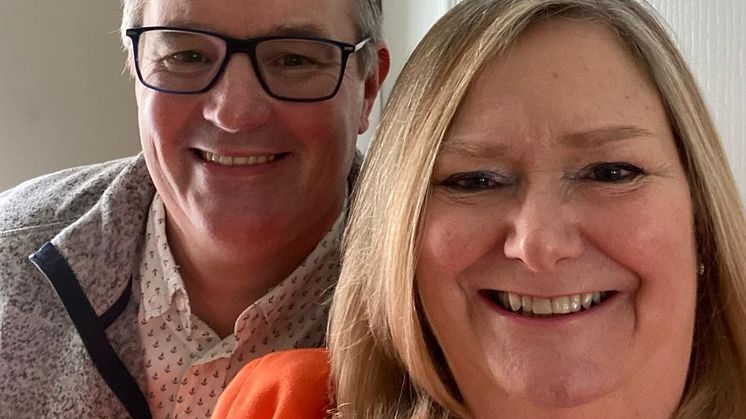
Press release -
Andover stroke survivor's husband tackles London Marathon to thank Stroke Association for supporting her
Peter Holden from Andover will be tackling the London Marathon in April as a thank you for the support his wife Lorraine and their family received from the Stroke Association after her strokes.
His challenge is made even more remarkable by the fact that 57-year-old Peter is himself a bowel cancer survivor. This will be Peter’s first marathon running with a colostomy bag, which he admits will be ‘interesting’.
The Stroke Association’s Hampshire Communication Support Service supported his wife, Lorraine, 59, after she had three strokes in 2022.
Peter said: “The Stroke Association have been fantastic in their support for my wife in her recovery, and also with their support for me and our wider family. They have been a real source of comfort and information.”
Lorraine’s first stroke happened on the first day of the family’s summer holiday in Spain. Shaking her head as if still in shock, she recalled: “It was supposed to be chill out time after a stressful few years with Pete’s cancer. The hardest thing is why. Why did these things happen to us?”
Lorraine spent two weeks in a local hospital before coming back to the UK. Three months later, she had another stroke. Two months after that, she had her third stroke.
As an administrative assistant in an NHS hospital and a long-term foster carer, Lorraine used to enjoy being busy and prided herself on her organisational skills.
Lorraine’s strokes have left her with aphasia, a condition which causes problems with language and affects speaking or understanding people. She recalls the frustration of forgetting words while speaking to her 16-year-old foster daughter and the self-criticism when she lost track of an important conversation topic with Peter.
Devastatingly, she also found out she could no longer read or write. Reading novels and texting friends had previously been enjoyable parts of her day. Other hidden effects were extreme fatigue, trouble concentrating and forgetfulness.
Lorraine described “living in a state of fear and anxiety that another stroke would occur”. She was unable to return to work or her role as a representative for foster carers at the agency. She did not feel confident enough to leave the house. Isolation spiralled into depression.
The Stroke Association’s Hampshire Communication Support Service has supported Lorraine since her second stroke. Local support coordinators work with stroke survivors and their families, friends and carers who are living with the effects of communication difficulties. It is vital as around two-thirds of stroke survivors will have communication problems directly after a stroke and one-third will have long-term difficulties.
As well as one-to-one support, the service also offers communication workshops. These are small groups led by a coordinator which allow stroke survivors to take part in structured activities to develop communication, practise strategies in a safe supportive space and receive valuable peer support from other stroke survivors.
Lorraine praises the coordinator, Jess, who visited her at home. She said: “I felt she understood what I was going through and gave me time to communicate.” The coordinator addressed Lorraine’s priorities and referred her to the local mental health service.
With regular support phone calls from the coordinator, Lorraine’s confidence gradually increased. Lorraine then attended a six-week communication workshop, and she now goes to a monthly online conversation group for working-age stroke survivors with communication difficulties. She has also made friends with another group member and they walk the dogs together.
Lorraine said: “Our group really helps; I like that we have a laugh and you can talk without somebody trying to talk for you. Other people don’t always understand stroke. When I put my make-up on then I look normal because I don’t have something physically wrong with me like a cut, but inside I sometimes feel unwell or very tired.”
Peter has also received support from the service and attended a session for relatives of stroke survivors with communication difficulties. He said: “It’s really useful to talk to people who are going through the same thing… To know there is light at the end of the tunnel, and that everyone’s tunnel length is different.”
His main target is to raise £3,500 for the Stroke Association and anything over will go to Bowel Cancer UK.
You can donate to Peter’s charity by visiting his Stroke Association fundraising page:https://events.stroke.org.uk/fundraisers/peterholden/london-marathon-2024
For more information about the Stroke Association’s Hampshire Communication Support Service, visit www.stroke.org.uk, call 01256 471301 or email HantsCommunicationSu@stroke.org.uk.
Topics
Categories
- Stroke strikes every five minutes in the UK and it changes lives in an instant.
- The Stroke Association is a charity working across the UK to support people to rebuild their lives after stroke. We believe that everyone deserves to live the best life they can after stroke. From local support services and groups, to online information and support, anyone affected by stroke can visit stroke.org.uk or call our dedicated Stroke Helpline on 0303 3033 100 to find out about support available locally.
- Our specialist support, research and campaigning are only possible with the courage and determination of the stroke community and the generosity of our supporters. With more donations and support, we can help rebuild even more lives.
- You can follow us on Twitter, Facebook and Instagram.


